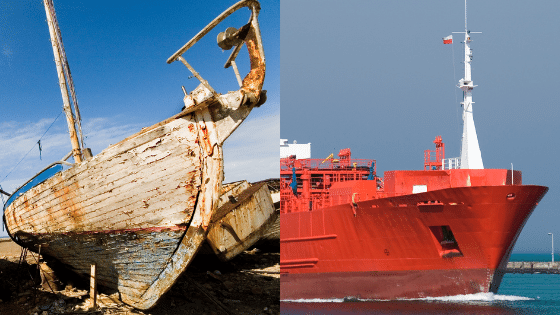
Unlike iron or carbon steel, stainless steel does not rust. On paper, it is one of the most durable metals on the market, at least in terms of rusting and corrosion. What makes stainless steel so tough? And… does stainless steel really not rust?
Let’s take a brief look at stainless steel — what it is, why it shouldn’t rust (but can), and how you can help prevent your stainless steel from corroding.
No matter its variety, all steel is an alloy composed primarily of iron with a tiny bit of carbon to give it strength and help it resist fracturing. Some steel also contains a smattering of other elements such as sulphur, oxygen, phosphorus, nickel, silicon, or chromium.
Kloeckner Metals is a full-line stainless steel supplier and service center. Download our stainless steel spec sheet and check what Kloeckner Metals routinely stocks.
Chromium is the key to corrosion prevention.
Stainless steel prevents rusting because of its composition. It contains a much higher amount of chromium than carbon steel. By definition, “stainless” steel must contain at least 10.5% chromium and no more than 1.2% carbon and other alloying elements.
As a result, carbon steel, which contains little chromium, is harder, but stainless steel is cleaner.
Chromium is a mineral found in everything from paint pigment to broccoli. In the 1800s, people used chromium to make products look beautiful since the element can be burnished to a high shine. Manufacturers still put chromium on cars, plumbing, and furniture. Today, 85% of the world’s chromium is used in making metal alloys like stainless steel.
Chromium and other elements react with air and water to form a thin film on the outside of the steel. This film serves as a barrier that prevents corrosion.
What if it gets damaged? The film repairs itself even if the stainless steel gets scratched or marred.
Stainless steel’s clean, corrosion-resistant surface makes it appropriate for a variety of products, including kitchen sinks, bank vaults, and spoons. Although it basically doesn’t rust, stainless steel is much weaker than carbon steel, making it unusable as a support for buildings or bridges.
Stainless steel comes in a variety of surface finishes from matte to bright. It can be brushed, engraved, tinted, or embossed. Strong and hard, stainless steel is also resistant to extreme temperatures and can withstand heat up to 800 C.
Since most detergents do not harm stainless steel, it’s easy to clean and thus popular as a component of kitchenware. Perhaps most importantly, it’s one of the greenest materials available. Fully recyclable, stainless steel has a near-100% actual recovery rate.
Stainless steel is not 100% corrosion resistant, however. In some situations, environmental conditions can lead to corrosion.
Any time stainless steel gets exposed to conditions beyond its grade, corrosion can take place. For example, high concentrations of phosphoric acid or nitric acid can damage stainless steel. Environmental stress may cause pitting or localized corrosion, and elevated temperatures can increase the corrosive power of many chemicals.
Strong chlorides such as salt can also corrode stainless steel. When in constant contact with saltwater or salty environments — on a Navy ship, for instance — grade 304 stainless steel will suffer pit corrosion. Either a specialized coating or upgrading to grade 316 stainless steel will solve this problem.
Welding stainless steel, especially two different varieties, can weaken the alloy’s natural defenses. The weaker stainless steel will start to corrode more quickly. In addition, fastening stainless steel to iron or carbon steel can cause it to deteriorate.
Finally, any extreme environment may damage stainless steel.
Below are all the factors that can cause stainless steel to corrode:
If you’re using stainless steel for the pots and pans in your home kitchen, corrosion should never be a problem. Industrial uses for stainless steel, however, might occasionally stress the alloy and cause it to wear down.
Here are four ways you can prevent stainless steel from corroding:
To return to our original question, does stainless steel rust? Under normal circumstances, no, stainless steel doesn’t rust. The chromium component in the alloy blend will protect the iron from rusting. Like nearly anything else, however, if you expose stainless steel to enough extreme environments, you can damage it.
Kloeckner Metals is a full-line stainless steel supplier and service center. Kloeckner Metals combines a national footprint with the latest fabrication and processing technologies alongside the most innovative customer service solutions.

Steel base plates are fundamental elements employed in various manufacturing...
Metal fabrication is a critical process that transforms raw metal...
The solar industry has undergone a significant transformation by incorporating...

X
The Kloeckner Metals website uses modern technologies. Unfortunately, your browser doesn't support those technologies.
Download the latest version of one of these browsers to experience the site: